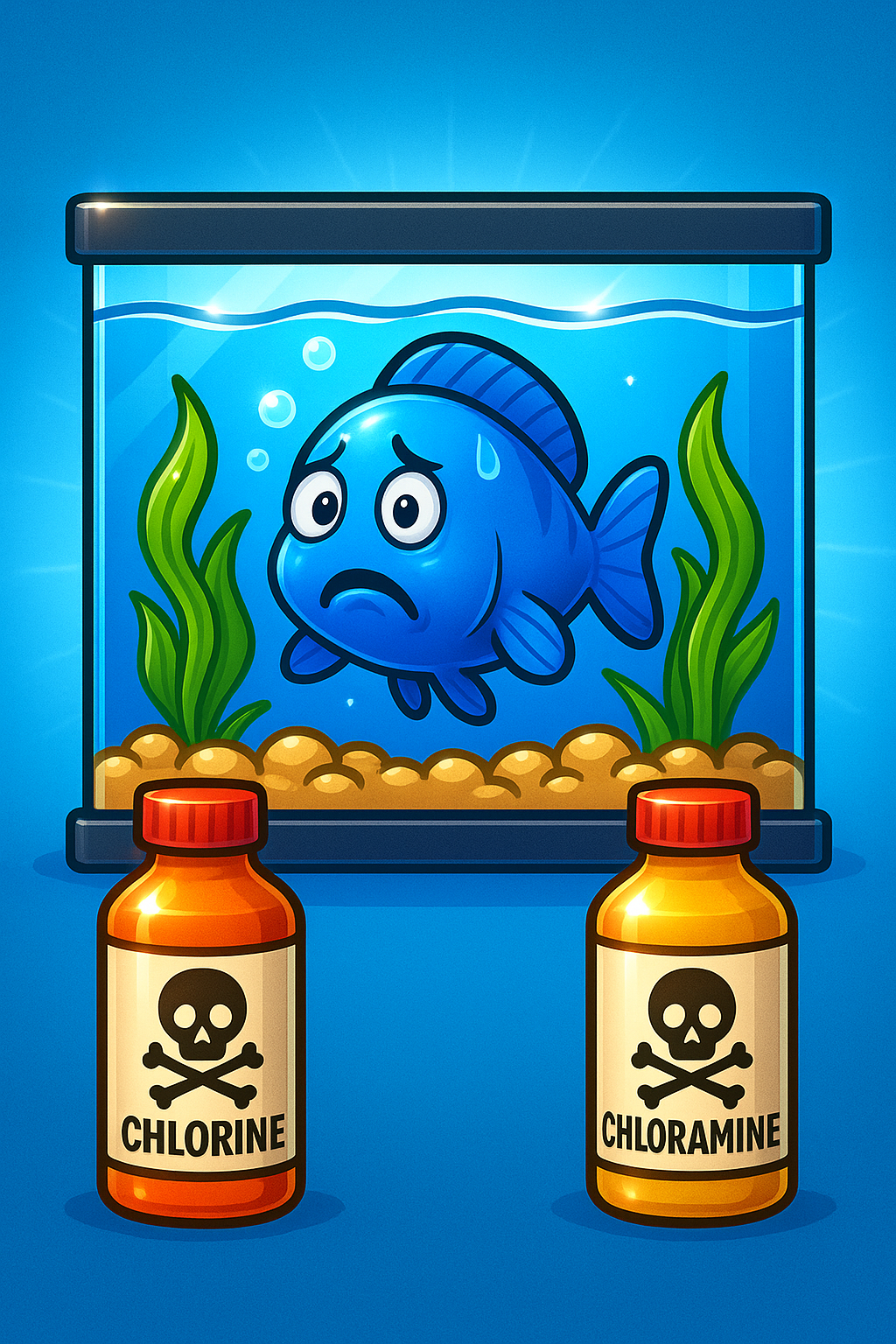Why Chlorine & Chloramine Are Harmful to Fish
💧 Why Chlorine & Chloramine Are Harmful to Fish
🧪 What They Are
- 🧼 Chlorine (Cl₂ → HOCl/OCl⁻ in water) → Strong oxidizer, kills microbes.
- 🧪 Chloramine (NH₂Cl) → Chlorine + ammonia, more stable, lasts longer in pipes.
- 🚰 Safe for people, deadly for aquariums.
⚠️ How They Harm Fish
- 🫁 Gills Burned → Oxidizes delicate tissue → fish gasp at surface.
- 🩸 Blood Damage → Red blood cells destroyed → less oxygen in bloodstream.
- 🧠 Stress & Weak Immunity → Higher risk of disease.
- 🦠 Biofilter Killed → Beneficial bacteria die → ammonia & nitrite spike.
- 🧨 Chloramine Bonus Problem → Breaks into chlorine + toxic ammonia.
📊 Sensitivity Levels
- 🚰 Tap water = 1–4 ppm chlorine/chloramine.
- 🐟 Fish stressed at <0.05 ppm.
- 🦐 Shrimp, snails, fry → even more sensitive (zero tolerance).
🧪 How to Tell What You Have
- 🔬 Free Chlorine Test → Shows chlorine only.
- 🔬 Total Chlorine Test → Shows chlorine + chloramine.
- ➖ Total − Free = Chloramine present.
- ⚠️ Use salicylate ammonia tests (not Nessler) with conditioners.
🧴 How to Remove Them
- 🧴 Water Conditioner → Instantly neutralizes chlorine & binds ammonia from chloramine.
- 🪵 Activated/Catalytic Carbon → Removes chlorine; catalytic carbon removes chloramine (needs good contact time).
- ⚗️ Chemical Reducers (Sodium Thiosulfate, etc.) → Cheap for big systems; needs precision + aeration.
- 🌬️ Aging/Aeration → Works only for chlorine (24–48 hrs). ❌ Not for chloramine.
📋 Best Practices for Water Changes
- 🧾 Know Your Source
- 📞 Call your local water supplier.
- 📝 Request a water quality report.
- ❓ Ask: Do you use chlorine, chloramine, or both?
- ⚡ Example: Some areas (like yours) use chlorine only, easier to neutralize.
- 🧪 Test Your Tap → Free & total chlorine before adding to tank.
- 🧴 Pre-Treat Water → Dose conditioner for the entire bucket/barrel.
- 💨 Aerate & Mix → Improves oxygen and spreads conditioner.
- 🧫 Double-Check → Ensure 0 ppm chlorine/chloramine before adding.
🚩 Warning Signs of Trouble
- 😮 Gasping at surface after water change.
- 🔴 Red or inflamed gills.
- 🌀 Erratic swimming or darting.
- 📉 Biofilter crash (ammonia/nitrite spike).
- ⚰️ Sudden unexplained deaths.
🌟 Pro Tips
- 🧴 Always treat all new water (not just what’s in the tank).
- 🧪 Test often — some utilities switch seasonally between chlorine & chloramine.
- 🪴 Plants, shrimp, fry → extra sensitive.
- 🛠️ Fish rooms: Use inline catalytic carbon + storage barrels.
- 📅 Keep a logbook → track test results & supplier updates.
✅ Bottom line: Chlorine & chloramine protect people, but they’re lethal to aquariums. Always know your water source, treat correctly, and test before water touches your fish.

Powered by Lightspeed
Display prices in:USD